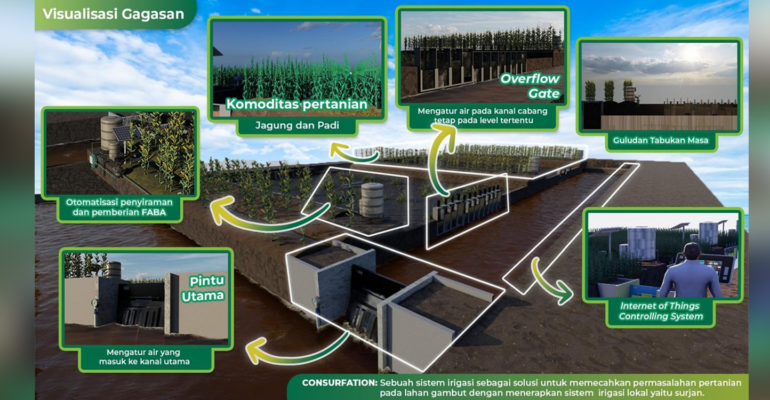Addressing Food Estate Problem in Peatland, IPB PKM VGK Team Creates Irrigation Model Based on Local Wisdom

IPB University’s Student Creativity Program for Constructive Ideas Video (PKM VGK) team has created an irrigation model to overcome food estate problems on peatlands in Kalimantan.
“This idea is based on our concern as students of the Faculty of Agriculture of IPB University to see the problems related to food estate. This project is just an ambitious project and does not fully involve academics from start to finish,” said Muhammad Saddham Aberalli as the team leader.
The student team consisted of Muhammad Saddham Aberalli, Muhammad Farzi Azri, and Elya Maulanisa from the Land Resource Management (MSL) Study Program, as well as Ivan Octavianto and Prilly Amelia Suhadi from the Landscape Architecture Study Program. They were mentored by Ir Wahyu Purwakusuma, MSc, MSL lecturer at IPB University.
Saddham explained that the research was conducted by looking at the problems that occur on peatlands and then looking for renewable solutions related to this. In the end, an advanced irrigation system was created, namely ‘Consurfation’.
This irrigation system adopts local irrigation, namely Surjan from Yogyakarta, to be applied to peatlands. Based on a literature study, this system can provide effectiveness in peatland conservation efforts and avoid land from monoculture farming systems that cause food diversification to not be implemented.
“The construction design of this innovation is simple but can function optimally. In addition, innovations with the latest technology can increase the use of technology in the agricultural system in Indonesia,” added Ivan as a team member.
In addition, this innovation utilizes coal waste, namely FABA or fly ash bottom ash as an ameliorant for peat soil. Ameliorants function to improve the physical and chemical properties of soil, which usually come from lime or dolomite.
“FABA is considered effective to replace the role of lime due to the large number of coal-fired power plants in Kalimantan. The team also conducted a survey to see FABA, namely at PLTU Labuan, Banten,” he added.
The next step, Ivan added, is to register this innovation for intellectual property rights (HAKI) and disseminate it to social media to increase public awareness regarding the solution to the problem. It is hoped that with this innovation, the government can pay more attention to the agricultural sector in Indonesia. (*/Rz) (IAAS/Hap)



